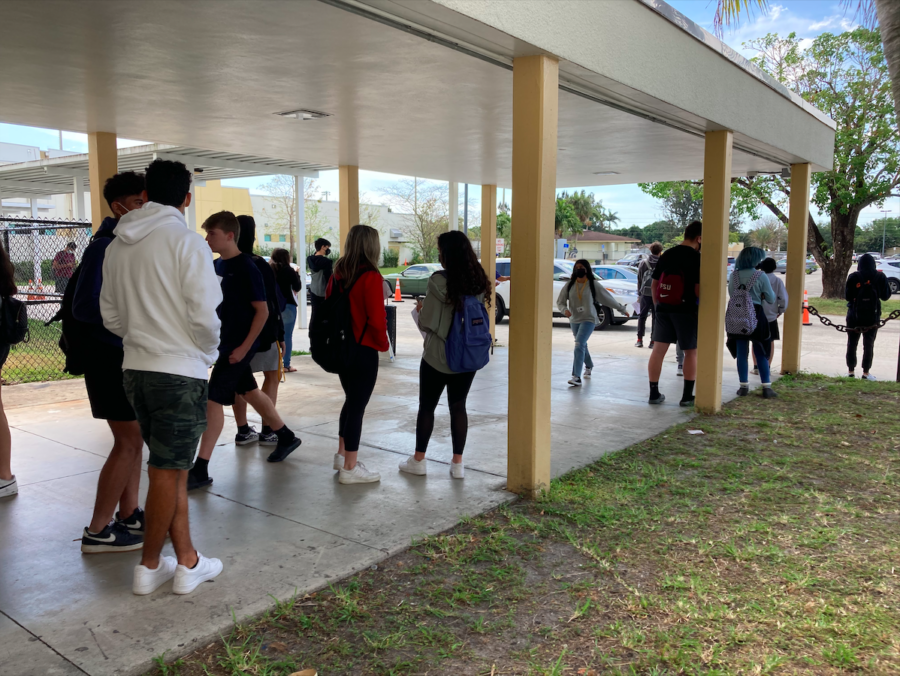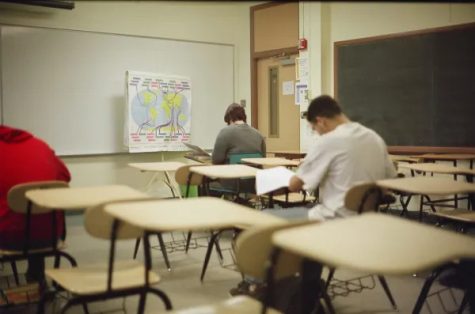Students return to campus for testing
In-person tests resumed in April and May with social distancing in effect.
Remote students wait for rides after the morning session of the FSA Writing exam on April 7.
Starting in April, students returned to campus for FSA, EOC, AICE and AP testing, which concludes in May and June.
During the first state test-FSA Writing, some students recalled the January 26 PSAT testing day, which was the first attempt at in-person testing on campus during the pandemic.
“I felt it [FSA testing] was way more organized this time than when I was there for PSAT testing,” sophomore Kiley Wilson said, “I was very scared at the school, but I think that’s because I’ve been locked away from people for so long.”
Communication between students and staff regarding early April testing protocol caused confusion. Students pondered where their testing rooms were or if they had to bring their own laptop. Many students this year have found themselves relying on teachers’ updates for testing through the Remind app; however, some find that Canvas global announcements are a more reliable source for information on testing. Although some teachers tried their best to update their students with testing information, students felt the communication could have been more clear.
“With my experience this year with FSA testing, they only told us what time to be there and that was about it,” junior Mia Woods said. “[We] had no clue where to go when we first got there and actually ended up getting yelled at multiple times due to the misunderstandings of location.”
Students report that one of the largest stressors is the feeling of being unprepared in this educational environment. Everything about testing during a pandemic is unfamiliar to students, so it is no surprise that students are discussing panic over lower scores or feeling unready for testing. Luckily, the state has made the decision to not count this year’s FSA scores towards student promotion or graduation.
“I appreciate that they came to this decision because this school year was difficult and it was hard to learn anything,” Wilson said, “It’s almost definite that scores will not be good.”
The Florida Department of Education came to this decision after releasing a new order for more flexibility regarding exams. This comes with the understanding that this year hasn’t been normal as students are trying to learn under strenuous conditions. Although test scores will not be used for promotion to the next grade level, standardized testing still allows teachers to gauge a students’ ability along with which class to place them in the following year.
Testing sessions can be tiring and stressful, but many have claimed learning coping methods or partaking in healthy stress-relieving activities can help this issue. Health specialists have noticed that taking breaks from studying can be helpful with retaining information and focus.
Along with students, testing coordinators feel the difference between planning and preparing for testing this year. Procedures like social distancing have altered room capacity numbers to hold 10 to 12 students which requires more rooms to be scheduled. Keeping students six feet apart was another challenge that added an extra step to preparing the classrooms.
“I do not have any office assistants, so everything falls on me to get done. I have some very helpful teacher friends and administrators that I am extremely grateful for. Otherwise, I don’t think it would get done,” student assessment specialist Kristi Esterline said.
End of course exams conclude next week while digital AP tests start May 18. AP students were given the option to take a paper and pencil test or opt for a later digital version. AICE exams continue in person through June.
“I understand it isn’t anyone’s fault the school year is like this. Testing is going to be very hard this year and I hope everyone can get through it,” Wilson said.










